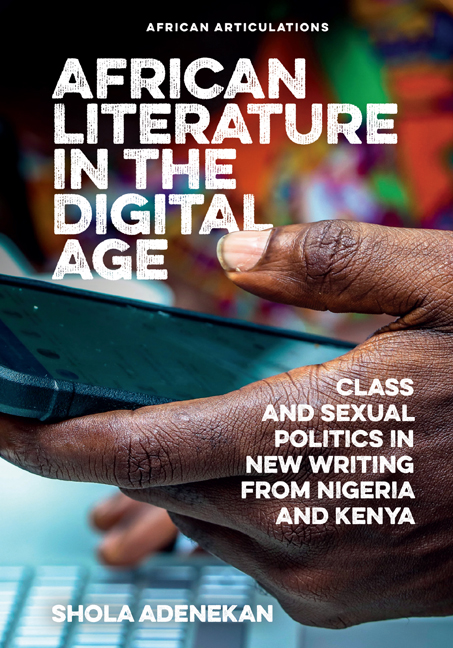 African Literature in the Digital Age
African Literature in the Digital Age Book contents
- Frontmatter
- Dedication
- Contents
- List of Illustrations
- Acknowledgements
- List of Abbreviations
- Introduction: Kenyan and Nigerian Writers in the Digital Age
- 1 Network Thinking: Literary Networks in the Digital Age
- 2 Class and Poetry in the Digital Age
- 3 Class Consciousness in Online Fictions
- 4 Digital Queer: The Queering of African Literature
- 5 Middle-Class, Transnational, Queer, and African
- 6 ‘Ashewo no be job’: The Figure of the Modern Girl in the Digital Age
- 7 The Erotic in New Writing from Nigeria
- 8 Social Media and the Aesthetics of the Quotidian
- Conclusion: Connecting the Dots
- Bibliography
- Index
- Miscellaneous Endmatter
7 - The Erotic in New Writing from Nigeria
- Frontmatter
- Dedication
- Contents
- List of Illustrations
- Acknowledgements
- List of Abbreviations
- Introduction: Kenyan and Nigerian Writers in the Digital Age
- 1 Network Thinking: Literary Networks in the Digital Age
- 2 Class and Poetry in the Digital Age
- 3 Class Consciousness in Online Fictions
- 4 Digital Queer: The Queering of African Literature
- 5 Middle-Class, Transnational, Queer, and African
- 6 ‘Ashewo no be job’: The Figure of the Modern Girl in the Digital Age
- 7 The Erotic in New Writing from Nigeria
- 8 Social Media and the Aesthetics of the Quotidian
- Conclusion: Connecting the Dots
- Bibliography
- Index
- Miscellaneous Endmatter
Summary
When examined through the scope of technology, new writings that focus on the erotic and the sexually explicit often reveal surprising results about repressed history and the impact of Euro-modernity on what many now consider as taboos. As discussed previously, for about two centuries in the Nigerian context, various forms of media technology have been intervening in the articulation of the sexual. From the early days of colonialism in the nineteenth century, Christian missionaries and colonial officials invested capital in schools and in printing presses, which they used to enforce a Victorian-style puritanism. The age of the printing press –from Irohin Yoruba to Random House –therefore positions African and Nigerian writing at the intersection of race, class and sex.
In the context of Nigerian literature, what can be deduced from much of the creative writing in the age of the book is that fictional characters such as Sẹgilọla and Jagua Nana, discussed in the previous chapter, did not come out of a vacuum; they reveal the discourses that helped problematise the idea of the modern and the notion of the traditional. During the heyday of colonialism, to be modern translated to embracing the Victorian era's Christian attitude towards sex as represented in works such as I.B. Thomas’ Itan Igbesi Aiye Emi Sẹgilọla Ẹlẹyinju,Ẹlẹgbẹrun ỌkọL’Aiye. The erotic, as represented in fictional narratives, is therefore an important way for us to see the confusion of what history and modernity represent for many Nigerians and Africans.
This legacy is not lost on the eminent Nigerian poet, dramatist and scholar Femi Osofisan, who, in a contribution to Outliers, a digital project on African sexuality, makes a case for literary studies’ closer engagement with the erotic as a means of analysing sexual history in Nigeria in particular, and Africa in general. His essay discusses the way in which different generations of Nigerian and African writers have dealt with sexual explicitness and the erotic. Osofisan argues that attitudes towards the overtly sexual have shifted remarkably in the twenty-first century, as a new generation of writers is now producing works that are less restrained when it comes to the portrayal of the erotic.
- Type
- Chapter
- Information
- African Literature in the Digital AgeClass and Sexual Politics in New Writing from Nigeria and Kenya, pp. 129 - 142Publisher: Boydell & BrewerPrint publication year: 2021


